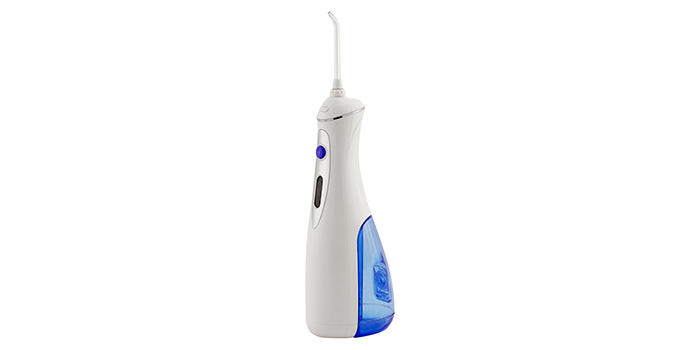December 31, 2019
If you are tired of using traditional dental floss, then water flossing may be an alternative solution. Water flossers wash away food particles and improve oral health more effectively than the traditional method of flossing.
Flossing is an essential part of maintaining oral hygiene as it keeps your teeth and gums healthy. Cleaning between your teeth can also help to prevent oral issues such as cavities and gum disease.
To provide you with a better understanding of the topic, we discussed what water flossing involves. In addition, our team looked at advantages and disadvantages of this alternative solution.
What are water flossers?
A water flosser (also known as an oral irrigator) looks like an electric toothbrush and releases a stream of water that is hard enough to clean between your teeth. Some water flossers enable you to mix water and mouthwash in them to enhance your oral cleanse.
Additionally, water flossers enable you to change the pressure of the water, so you always have control over the device. Some devices are now cordless, meaning you can take it wherever you want. You can even use it in the shower for your convenience.
If you have trouble handling the traditional floss string, a water flosser is an alternative solution. Furthermore, people who have braces may also find it easier to use a water flosser to clean their teeth more effectively.

Advantages of water flossers
There are many benefits of using a water flosser. We have outlined several of them below.
No plastic waste
Water flossers are environmentally friendly as they are reusable and leave no plastic waste behind after use.
Safe and aid dental treatments
To ensure a longer lifespan for dental procedures such as dental implants, maintaining great oral hygiene is essential. Water flossers are a gentle and effective way to clean your teeth, without disrupting your treatment post-procedure.
In addition, by adjusting the water pressure and angle of the device, you can clean gaps in between your teeth without the threat of your string getting caught within dental objects such as braces.
Reduces risk of periodontitis (gum disease)
The pressure of the water that is emitted out of the device enables you to reach beneath your gum line and clean out more bacteria. As a result, water flossers remove plaque and may help reduce the risk of cavities and gum disease.
Easy to use
Unlike the traditional flossing method, a water flosser requires less manual input to produce results. It can take up to 1 minute to clean your entire mouth and some products are portable.
Disadvantages of water flossers
Water flossers also have some disadvantages. If you don’t have much space in the bathroom or like to floss on the go, they might not be the right solution for you.
Storage or handling
Some water flosses are perceived as too bulky and difficult to carry. They also take up storage space on your bathroom counter. Therefore, some patients tend to stick to the traditional flossing method as it is more suitable for their lifestyle.
Needs electricity and water
Like all water flossers, you need water in them for it to work. There are also some water flossing devices that are not portable and require you to charge them through a power cord. If you are out camping or do not have access to electricity, you will not be able to use it.
Cost
The cost of a water flosser is higher than the traditional floss string. Therefore, the device requires an initial investment. Prices generally range from $50 – $300, depending on the supplier and the product.
There are a variety of water flosser brands, such as:
- Philips Sonicare AirFloss Rechargeable Electric Flosser
- Waterpik Aquarius Water Flosser
- Zerhunt Cordless Water Flosser
- Panasonic Portable
It is your choice
Depending on your personal preference, it is up to you whether you would like to use a water flosser or not.
From a dentist’s perspective, it is fair to say that water flossers have a greater impact on cleaning out bacteria between your teeth than flossing with traditional string and interdental brushes.
However, we recommend you consult with your dentist first to ensure you make the right decision to suit your needs.
Book an appointment
Let our team help you to stay on top of your oral health! Book an appointment online 24/7 today or contact us for more information.

